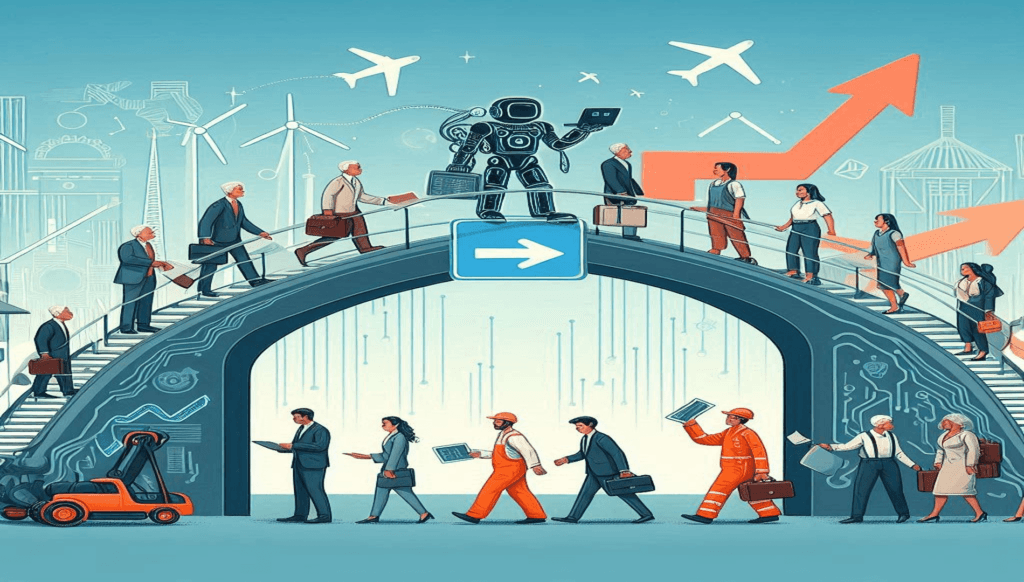
In Brief: Explore the evolving job market with insights from the Future of Jobs Report 2025—uncover rising roles, declining jobs, and strategies to thrive in a shifting workforce.
The world of work is in constant motion. It’s a dynamic landscape where the forces of technology, economics, and societal shifts converge to reshape industries and redefine the skills required for success. As we navigate this era of unprecedented change, understanding the job market transformation—the ebb and flow of job growth and decline—becomes crucial for both individuals charting their career paths and organizations striving for sustainable growth. What exactly is driving this shift? And, perhaps more importantly, how can we prepare for the future of work in the face of job market transformation?
We delve into the heart of the job market transformation in this article, exploring which roles are poised to flourish and which are facing obsolescence. We’ll draw insights from the World Economic Forum’s Future of Jobs Report 2025, analyzing the data and expert opinions to provide a comprehensive view of the evolving employment landscape.
Understanding the Forces Behind Job Market Transformation
Before we examine the specific roles, let’s take a moment to understand the key drivers of this job market transformation. The Future of Jobs Report 2025 identifies five major macrotrends impacting the labour market:
- Technological Change: Advancements in artificial intelligence (AI), automation, and digital access are revolutionizing industries. We expect that broadening digital access will be the most transformative trend overall.
- The Green Transition: The shift towards sustainable practices and renewable energy is creating new opportunities and reshaping existing sectors.
- Geoeconomic Fragmentation: Rising geopolitical tensions and trade restrictions are altering global supply chains and influencing business strategies.
- Economic Uncertainty: Fluctuations in economic growth, inflation, and cost of living are impacting job creation and skill demands.
- Demographic Shifts: Aging populations, changing workforce demographics, and migration patterns are also reshaping the labour market.
These forces are not operating in isolation; instead, they interact in complex ways to create a dynamic and, at times, unpredictable job market transformation. For instance, technological advancements intersect with the green transition to drive the demand for roles in renewable energy and sustainable technology. In addition, economic uncertainty and geopolitical fragmentation can lead to shifts in hiring and supply chains, impacting diverse sectors.
Job Market Transformation: Roles on the Rise
These macrotrends indicate that several job roles will grow significantly over the next five years. The Future of Jobs Report 2025 highlights that, by 2030, macrotrend-driven job creation will amount to 170 million jobs, equivalent to 14% of today’s formal jobs. Here are some of the fastest-growing roles, as identified in the report, which are experiencing job market transformation:
Technology and Innovation
- AI and Machine Learning Specialists: As AI continues to permeate various sectors, the demand for experts in this field will continue to increase. According to the report, AI and information processing technologies are among the top three drivers of growth for the 10 fastest-growing jobs. For instance, the report’s data shows that in various economies, like India, companies are heavily investing in AI, and the fastest-growing job roles align closely with this trend.Big Data Specialists and AI and Machine Learning Specialists lead the job roles with the largest projected industry demand in the Professional Services sector.
- Robotics Engineers: The increasing adoption of automation and robotics across industries means that professionals with the expertise to design, build, and maintain these systems are in high demand.
- Data Analysts and Scientists: The ability to analyze and interpret data is becoming increasingly valuable as companies seek to make data-driven decisions.
Environmental and Social Impact
- Sustainability Specialists: With growing concern about climate change, there’s a growing demand for professionals who can help organizations become more environmentally responsible.
Business and Growth
- Business Development Professionals: Companies need skilled professionals to navigate the evolving economic landscape and seek new growth opportunities.
These roles share a common thread: they often require a combination of technical skills, analytical abilities, and adaptability. Many of them are also related to digital transformation, highlighting the importance of delivering seamless digital experiences and understanding the impact of consumer behaviour. These roles represent the changing needs of organizations as they navigate the complex and dynamic world of the job market transformation.
Job Market Transformation: Roles in Decline
Unfortunately, not all job roles are experiencing growth. As the labour market evolves, some roles are facing a decline due to automation and technological advancements. These roles will diminish due to the job market transformation:
- Clerical and Secretarial Workers: The increasing use of automation and AI in administrative tasks will likely lead to a decrease in demand for these roles.
- Data Entry Clerks: With more sophisticated software and automated data collection processes, this job is becoming less relevant.
- Cashiers and Ticket Clerks: Automation in retail and other sectors is leading to a decline in this role.
- Bank Tellers and Related Clerks: Online banking and digital financial services are reducing the need for traditional bank tellers.
- Postal Service Clerks: Email, instant messaging, and digital communications are reducing the reliance on traditional postal services.
- Assembly and Factory Workers: As robotics and automation become more prevalent, manual labour jobs in manufacturing are also facing a decline.
It is important to acknowledge that the report does not intend for these job categories to be exhaustive, rather it serves as a means to provide insight into selected segments of the global workforce. In addition, these job categories may vary across regions. For example, companies in Eastern Asia expect ageing and declining working-age populations and slower economic growth to transform the region’s labour markets. In Sub-Saharan Africa, 64% of businesses expect an increasing focus on labour and social issues to be a key trend impacting their business strategy over the 2025-2030 period.
People in these roles often perform repetitive tasks, manual labor, or use traditional methods of communication and information processing. As companies adopt new technologies, roles like these are increasingly susceptible to automation and decline.
Skills for the Future of Work in a Time of Job Market Transformation
As the demand for certain job roles shifts, so too does the demand for specific skills. The report emphasizes that skill gaps are considered the biggest barrier to business transformation, with 63% of employers identifying them as a major issue over the 2025-2030 period. To navigate this job market transformation, individuals and organizations must prioritize upskilling and reskilling.
These key skills will rise in importance:
- Analytical Thinking: This remains the most sought-after core skill among employers. Seven out of 10 companies consider it essential in 2025.
- Resilience, Flexibility, and Agility: In a world of constant change, these skills are crucial for adapting to new situations.
- AI and Big Data: Expertise in these areas is essential for success in a technology-driven world.
- Networks and Cybersecurity: As digital systems become more prevalent, the need for professionals to protect them also grows.
- Technological Literacy: A basic understanding of technology is now essential in virtually all professions.
- Creative Thinking: As machines take over routine tasks, the ability to think creatively and develop innovative solutions becomes increasingly important.
- Curiosity and Lifelong Learning: The rapid pace of change requires a commitment to continuous learning and adaptation.
It’s worth noting that while technology skills are critical, human-centred skills also remain vital. Skills like empathy, active listening, and collaboration are increasingly important, ensuring a balance of hard and soft skills. As the report notes, skills such as manual dexterity, endurance, and precision are expected to decline in relevance. In my opinion, the most successful professionals will be those who can blend technical knowledge with human-centric capabilities.
Strategies for Navigating the Job Market Transformation
The job market transformation presents both challenges and opportunities. Here are some strategies that can help individuals and organizations thrive:
Skills Development and Learning
- Upskilling and Reskilling: Organizations need to invest in training their employees to acquire the skills necessary for emerging roles. According to the report, 85% of employers plan to prioritize upskilling their workforce. Employers foresee that 29 out of 100 workers could be upskilled in their current roles and 19 could be upskilled and redeployed elsewhere within their organization.
- Skills-Based Hiring: Companies are increasingly focusing on work experience and skills assessments rather than solely relying on traditional credentials like university degrees. The report notes that 48% of employers expect to use skills assessments, highlighting a growing emphasis on directly testing candidates’ competencies.
Diversity and Inclusion
- Diversifying Talent Pools: Companies need to tap into a wider range of talent, including those from underrepresented groups. As an example, to address talent needs, companies operating in India expect to tap into diverse talent pools (67%, compared to 47% globally) and adopt skills-based hiring by removing degree requirements (30%, compared to 19% globally).
- Supporting Employee Well-Being: Organizations need to prioritize employee health and well-being as a key strategy to attract and retain talent. According to the report, supporting employee health and well-being is expected to be a top focus for talent attraction, with 64% of employers surveyed identifying it as a key strategy.
Technological Integration
- Focusing on Human-Machine Collaboration: Rather than substituting human capabilities, technology should be used to enhance human potential. As the report emphasizes, GenAI has the potential to augment human skills through human-machine collaboration.
By embracing these strategies, individuals and organizations can adapt to the changing landscape of the job market transformation and create a more resilient and prosperous future of work.
Here’s What I Think:
The job market transformation is not a future event; it’s happening now. While the rapid pace of change can be unsettling, I believe that it also presents an unprecedented opportunity for innovation and growth. As organizations and individuals, we must prepare for this job market transformation by embracing change, investing in skills development, and creating more inclusive workplaces. It also serves as an opportunity to think critically about how we can harness the power of technology to enhance human potential and build a future of work that is both productive and fulfilling. Ultimately, navigating this evolving landscape will require a combination of strategic planning, adaptability, and a commitment to lifelong learning. We have the power to shape this transformation, and by working together, we can create a brighter future for all.
Sources of Insights
World Economic Forum. (2025). The Future of Jobs Report 2025.

Ajay Dhage is a seasoned talent acquisition leader with over 20 years of experience in Talent Acquisition and Workforce Strategy across the oil and gas, EPC, and renewables sectors. As Talent Acquisition Lead for a global Oil & Gas EPC company in India, he manages the end-to-end hiring lifecycle for complex, multi-disciplinary projects, from sourcing and assessment to onboarding and workforce planning. Known for his customer-focused approach and innovative use of AI and data in hiring, Ajay focuses on building future-ready workforces and resilient leadership pipelines. Through ajayable.com, he shares insights, trends, and practical frameworks to help HR professionals, organisations, and recruiters excel in a rapidly evolving, competitive talent landscape.
Leave a Reply